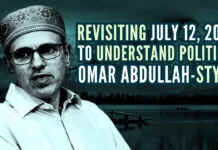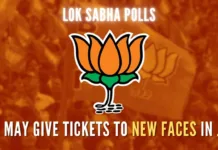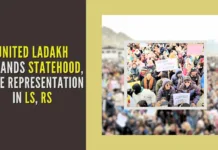
Both the NC and the PDP took the linking of Article 35-A to the proposed civic polls to mean a hint that the Jammu & Kashmir Government and the Government of India might dilute Article 35-A
It was on September 15 that Jammu & Kashmir Government announced four-phase election schedule for the Urban Local Bodies (ULB) in the state. Announcing the much-awaited decision Chief Electoral Officer (CEO) Shaleen Kabra said in Srinagar that the elections will be held on October 8, 10, 13 and 16; that counting will be held on October 20, and that entire poll process will be over by October 27. (People of Jammu & Kashmir will elect new municipal corporations, municipal councils, municipal committees and panchayats after a long gap of 13 years.)
The Governor’s administration held its ground firmly and declared that elections will be held “as per schedule” and that the civic elections and Article 35-A were two different things and couldn’t be mixed.
It was a bold decision given the fact that the Kashmir-based National Conference (NC) of Farooq Abdullah and People’s Democratic Party (PDP) of Mehbooba Mufti had announced that they would boycott the proposed ULB and panchayat elections in case the Jammu & Kashmir Governor, Satya Pal Malik, and the Narendra Modi-led NDA Government failed to hold out a categorical commitment that they would not tinker with Article 35-A and that both the governments will defend it in the Supreme Court. The NC even went to the extent of saying that it will also boycott the 2019 general elections and assembly elections, whenever held, if the powers-that-be failed to clear their stand on Article 35-A. They took this extreme stand after August 31, when the Supreme Court deferred the hearing on Article 35-A till January 19, 2019 endorsing the plea of the Jammu & Kashmir Government and the Government of India that hearing on PILs opposing and favouring Article 35-A could create law and order problem in the state as the Jammu & Kashmir Government had planned ULB and Panchayat elections and the process to elect new corporations, municipal councils, municipal committees and panchayats would be completed by the end of December.
Both the NC and the PDP took the linking of Article 35-A to the proposed civic polls to mean a hint that the Jammu & Kashmir Government and the Government of India might dilute Article 35-A or get it repealed. What actually provoked these Kashmir-based parties to take an extreme position were the remarks of the Additional Solicitor General Tushar Mehta on Article 35-A. He had, on August 31, said in the Supreme Court that “he agreed to the contention that Article 35-A and certain aspects needed to be debated upon” and that “it can’t be denied that there is an aspect of gender discrimination in it (Article 35-A)”.
(Article 35-A makes disturbing, unjust, invidious and humiliating distinctions between Jammu & Kashmir men and women and between the residents of Jammu & Kashmir and the rest of the Indians in the matters of citizenship, scholarships, jobs, property rights and voting rights.)
However, the Governor’s administration held its ground firmly and declared that elections will be held “as per schedule” and that the civic elections and Article 35-A were two different things and couldn’t be mixed. So much so, Governor Satya Pal Malik told Kashmiri leaders that “they have to fight their case in the court” as far as Article 35-A is concerned. The NC and the PDP delegations led by NC vice-president Omar Abdullah and PDP President Mehbooba Mufti, respectively, also met with Governor Malik hoping that he might kneel, but nothing came out of these meetings.
The most significant aspect of the whole situation is the very positive response of Muslims in Jammu and Ladakh to the landmark decision of the government to hold elections
It was not just that the NC and the PDP had announced the poll boycott. Separatists of all hues in Kashmir too had given a call for poll boycott. Not just this, the CPI-M and other smaller political groups in Kashmir also had jumped on to the bandwagon of the NC and the PDP and declared that they will also not take part in the proposed civic polls as the authorities had failed to assure the people of Kashmir that Article 35-A shall be protected at any cost. As for the Congress, it only dilly-dallied. It decided to test political waters in the state only after the high command directed the local Congress leadership to contest the ULB and panchayat polls.
It was obvious that Prime Minister Narendra Modi, who had declared from the ramparts of the Red Fort in Delhi on August 15, that his government was committed to strengthen democracy at the grassroots level in Jammu & Kashmir, remained firm. He rejected outright the politics of blackmail and threat as being indulged in by Kashmiri leaders ever since October 1947, when Jammu & Kashmir acceded to India in terms of the constitutional law on the subject. It was perhaps for the first time in 71 years that New Delhi acted firmly and resolutely. No wonder then that while the firm stand of the powers-that-be in the state and at the centre electrified the political scenes of Jammu and Ladakh, it dampened the spirit in the political camps in Kashmir.
Why should the ongoing election exercise at grassroots level be taken to mean a boon for the bleeding and exploited nation? Why should it also open eyes of the international community? It should be considered a boon for the nation and open eyes of the international community and world forums, including United Nations, because it has established beyond any shadow of doubt that Jammu and Ladakh, which constitute nearly 89 per cement of the Jammu & Kashmir’s land area and house more than 50 per cent of the state’s population, have nothing to do with the Kashmir jihad. It should also leave no one in any doubt that separatists in Kashmir, including Syed Ali Shah Geelani, Mirwaiz Umar Farooq and Yasin Malik; protagonists of autonomy, self-rule and India-Pakistan joint-control over Jammu & Kashmir, including Farooq Abdullah and Mehbooba Mufti; and Saif-ud-Din of Congress, votary of trilateral talks between India, Pakistan and Kashmiri Muslims, have no say whatsoever in Jammu and Ladakh.
The people of Jammu and Ladakh whose watchword and battle-cry all along has been the state’s complete merger with India and application of the Indian Constitution to the state in full, barring divisive and discriminatory Articles 35-A and 370, have rejected outright all the Kashmiri leaders by taking part in the ongoing electoral exercise in large numbers and with great enthusiasm. The most significant aspect of the whole situation is the very positive response of Muslims in Jammu and Ladakh to the landmark decision of the government to hold elections much to the chagrin of Kashmiri leaders like Farooq Abdullah and Mehbooba Mufti. They, like Hindus and Sikhs of Jammu and Buddhists of Ladakh, are taking part in large numbers.
That the people of Jammu and Ladakh have boycotted the poll boycott decision of the NC and the PDP could be seen from the fact that as many as 2,136 candidates – Hindus, Muslims and Sikhs — have filed nomination papers for all the 534 wards in Jammu province and 66 candidates – Buddhists and Shia Muslims – have filed nomination papers for all the 26 wards in Ladakh, 13 each in Buddhist-majority Leh and Shia-majority Kargil. There were only 13 wards in Jammu province where the candidates have won the election unopposed. As for the remaining 521 wards, 2,123 candidates are testing political waters across Jammu province. As for Ladakh, not a single candidate has been elected unopposed. In other words, all the 26 wards are witnessing keen contests.
The story of Kashmir is altogether different. There are 624 wards across Kashmir. Not one candidate filed nomination papers in as many as 177 wards. In 215 wards, the candidates won the election unopposed. These also included at least 36 internally-displaced Kashmiri Hindus living in Jammu since January 1990, when the whole Hindu community migrated from Kashmir to escape the wrath of separatists and militants. It is only in the remaining 232 wards that nearly 800 candidates are in the fray. Srinagar, a hotbed of militancy, is the only city in Kashmir where candidates have filed nomination papers in all the wards.
The contest in the 232 wards in Kashmir and 26 wards in Ladakh is mainly between the BJP and the Congress. As for Jammu, the contest is between the BJP, the Congress and Jammu & Kashmir National Panthers Party. Many independent candidates have also taken the plunge in Jammu.
All this serve to demonstrate that Kashmiri leaders of all hues have no say whatsoever in Jammu and Ladakh and that their area of influence is confined only to a few pockets in Kashmir, which has been at the helm of affairs since 1947 controlling political power, civil secretariat, financial institutions, recruitment agencies, trade, commerce, industry, transport and what not. Indian political class and media and international community would do well to recognise this ground reality in Jammu & Kashmir and refrain from creating an impression that Kashmir means the entire State of Jammu & Kashmir and that fulfilling the separatist urges of Kashmiri Muslims would be the same as meeting the needs, aspirations and compulsions of the people of Jammu and Ladakh. The best option available is trifurcation of the state into Jammu, Kashmir and the Ladakh States and creation of a dispensation in the Valley that satisfies the internally-displaced Kashmiri Hindus and secures their life.
Note:
1. The views expressed here are those of the author and do not necessarily represent or reflect the views of PGurus.
- ‘Kashmir My core constituency’: Revisiting July 12, 2003 to understand politics, Omar Abdullah-style - March 15, 2024
- Total deviation from traditional approach: Seven takeaways from PM Modi’s March 7 Srinagar visit - March 9, 2024
- Status of political parties: Why is further J&K reorganization imperative? - March 1, 2024











Boycott call of Local body elections in J&K by NC, PDP and other REFINED terrorist outfits like Geelani, Yasin Malik etal are one way Good. Its self negation and abdication and also a well deserved GOOD RIDDANCE from J&K grassroot level.
If so called Home grown Pro muslim parties want tobboycott its good for J&K. These are people who are guiding public in wrong direction….